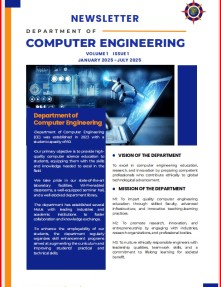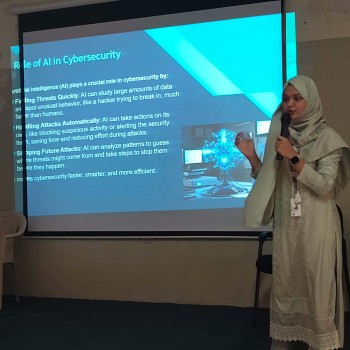A New Dimension in the field of Computer Science
PESITM Shivamogga is proud to be the only institute in South India to offer Computer Engineering Course. This article will brief you about the course and its scope.
PESITM is an ISO 9001 Certified institute. Since its establishment in the year 2007, they have grown from strength to strength and is currently offering a multitude of courses in Engineering and Management.PESITMcurrently offers engineering programs in Computer Science, Electronics & Communication, Mechanical, Electrical & Electronics, Information Science, Civil and they have recently added new courses such as Artificial Intelligence and Machine Learning, Data Science and Computer Science & Design. They are also offering PG courses such as MBA & MCA. PESITM being one of the institutes under PES Trust ®, is well known for quality education and service.
PESITM is growing and is establishing its legacy as academic excellence. The sole vision is to produce good engineers with human values and Indian ethos. They always focus on the holistic development of the students by a combination of both curricular and extracurricular activities. They believe that to develop a tender mind, they have to go beyond classroom teaching and we make students' industry ready. The excellent world-class infrastructure with modern facilities, teaching faculty of the best kind, ensure quality education and a bright future to the students. More details about PESITM can be found at http://pestrust.edu.in/pesitm/.
Computer Engineering uses principles from Computer Science and Electrical Engineering to create hardware (physical components) and firmware which are used in a wide range of areas such as: consumer electronics, medical devices, communication systems, aircraft, self-driving cars, etc.Computer Engineering students learn how to develop, prototype, and test microchips, circuits, processors, conductors and any other component used in computer devices or systems (e.g. supercomputers, smartphones, laptops, servers, IoT gadgets). They also develop firmware, an essential type of software that allows operating systems and applications to take full advantage of the hardware. Computer Engineering has evolved over the past three decades as a separate, although intimately related, discipline. Computer engineering is solidly grounded in the theories and principles of computing, mathematics, science, and engineering and it applies these theories and principles to solve technical problems through the design of computing hardware, software, networks, and processes.

Historically, the field of computer engineering has been widely viewed as "designing computers". In reality, the design of computers themselves has been the province of relatively few highly skilled engineers whose goal was to push forward the limits of computer and microelectronics technology. The successful miniaturization of silicon devices and their increased reliability as system building blocks has created an environment in which computers have replaced the more conventional electronic devices. These applications manifest themselves in the proliferation of mobile telephones, personal digital assistants, location-aware devices, digital cameras, and similar products. It also reveals itself in the myriad of applications involving embedded systems, namely those computing systems that appear in applications such as automobiles, large- scale electronic devices, and major appliances. Increasingly, computer engineers are involved in the design of computer-based systems to address highly specialized and specific application needs.
The goal of computer engineering is to expand the capability and applicability of computers. For example, computer engineers may seek devices that process information more quickly than in previous iterations; they may seek to make computers smaller and more portable, and they may innovate new functions for computer technology or work to increase accessibility. Defining computer engineering requires a discussion of computer science and electronic engineering. Indeed, computer engineering is often defined as the integration of these two disciplines.
- Computer science is the study of computers and computational systems and the use of advanced algorithms to help solve common computing problems.
- Electronic engineering involves the design and development of circuits, circuit boards, and other electronic elements that allow computers to function.
- Because computer engineers combine these fields, they are able to advance the usefulness and potency of computers by enhancing software, systems, and networks as well as by improving computer hardware itself.
Faculty
In addition to general Computer Engineering degrees, universities and colleges also offer different specialisations or subdisciplines if you want to narrow down your focus. Here are a few examples:
- Hardware Systems
- Distributed Computing
- Robotics and Cybernetics
- Embedded Systems
- Computer Graphics and Visualisation
- Medical Image Computing
- Computer and Network Security
The basic duties of computer engineers involve researching, designing, developing, and testing all aspects of a computer system. Computer engineering entails software development. This may involve:
- Operating systems
- Instant messaging and email systems
- Web browsers
- Applications of all kinds, from databases to spreadsheets to video games
- Security components such as firewalls and antivirus software
- Utilities such as file backups
Computer engineers may address the various components that comprise computer hardware, including:
- Microprocessors
- Memory chips, including RAM and ROM
- Data storage devices such as hard disks and optical drives
- Input devices (keyboards, joysticks, computer mice) and output devices (scanners, printers, remote controls)
- Networking components such as routers and modems
Computer engineers may pull together all of these components to address a problem or improve computing efficiency. They are then tasked with carefully testing and refining their solutions as needed. Specific projects that a computer engineer takes on may range from extending the battery life of a new smart device to correcting bugs and glitches in a particular software program. Computer engineers also may simply look for ways to make devices smaller, faster, or more powerful.
Computer engineers work in a wide range of different industries. The most obvious example of where computer engineers work is at computer companies, such as Apple, Microsoft, Texas Instruments, and Dell. However, computer engineering positions are also crucial in the following fields:
- Telecommunications (optic cable work, circuit design, and other tasks)
- Aerospace (developing aviation software, for example)
- Automotive (designing or improving the computers used in the electrical systems of cars)
- Health care (developing diagnostic software and data management tools, among other tasks)
- Software or video game design companies (fixing bugs and innovating new security protocol)
- Analytical thinking
- Problem-solving
- Creativity
- Critical thinking
- Attention to details
- Technical writing
With the use of these skills, computer engineers find new solutions that make our devices faster, safer, and more power-efficient. If you’ve ever wondered how new phones or computers are better than previous models, it’s thanks to all the hard work put into designing faster components and more optimised operating systems and applications.
The future computer engineers don’t need to worry about job opportunities despite the highly competitive market. You’ll have a well-paid job, and your salary will increase with experience. Computer Engineering jobs are also safe from the automation process, which looks likely to take out many work opportunities in the future.
- You can see Computer Engineering as either a Computer Science or Electrical Engineering specialisation.
- Computer Engineers mainly work on developing the hardware (the physical components) that are used in most machines and gadgets we use today.
- Computer Engineering jobs with high salaries are expected to grow steadily in the next decade.
- You should study a Computer Engineering degree if you’re a tinker, someone who enjoys taking things apart, understanding how they work, improving them, and creating better models with each iteration.
News Letter
 View
View
Contact Us

Dr. Arjun U
Professor and Head
Computer Engineering
PES Institute of Technology and Management
NH 206, Sagar Road, Shivamogga – 577 204
Office: 8147053073
Email:
hodce@pestrust.edu.in













